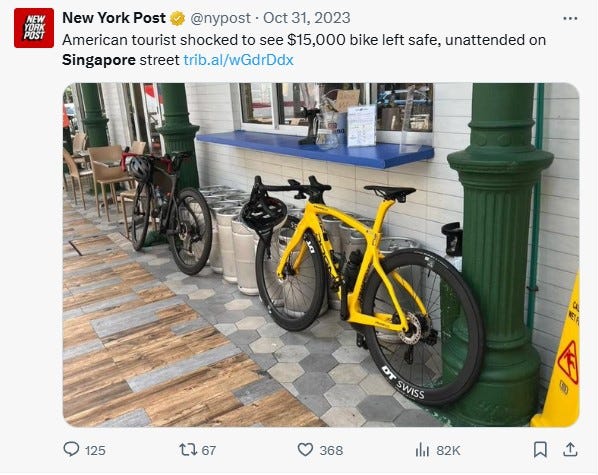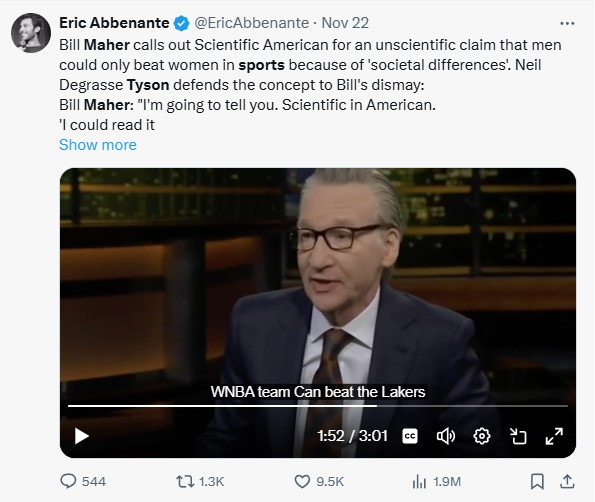Should We “Trust the Experts?”
On CNN, Neil DeGrasse Tyson recently chided the public to listen to the “experts” instead of doing their own research, which is sort of the default position you’d expect from one of the Left’s dubious go-to science “experts”:
However, there are a lot of problems with Tyson’s advice, starting with the fact that America could fairly be called a “low trust” society today. Granted, we’re not one of the worst examples of that. We’re not the old Soviet Union, where the news was quite literally government-sponsored propaganda, or Mexico, where the police are as likely to be on the take or working with the criminals as help you, but Americans have lost a lot of trust in each other and our institutions.
You don’t leave your doors unlocked. You can’t trust the government or the media to tell you the truth. You have to constantly wonder if doctors, scientists, or the media sources you’re listening to are being honest with you. Sometimes, you almost feel like you have to evaluate what’s true and false on a case-by-case basis.
This is a moral failing of our society because it doesn’t have to be this way. For example, there was a time in living memory for many older Americans when most people trusted the government to do the right thing and believed the media was telling them the truth. You might think that was naïve, but it was not. While they were far from perfect, the government and media really were orders of magnitude more honest with the public than they are today.
Additionally, there are still plenty of places in the world where the government is more honest and efficient than we see at the federal level here and the crime rate is so low people don’t worry about getting ripped off:
Incidentally, we could have that in America as well, but it would require draconian penalties for theft, a more moral population, and a willingness to vote politicians out of office for lying to us even if they’re, “on your side.” I’d love to see that happen here. Would you?
Now, that brings us back to whether we should “trust the experts.”
Of course, three relevant questions come to mind.
What are they experts in? How good is their track record? Can you trust them to give an unbiased opinion?
The first question is relevant because some things are very specialized and either their experience matters a great deal or “doing your own research” is very difficult. If you’re talking about rocket science, the particulars of brain surgery, or quantum physics, very few people may have the knowledge level to question the “experts.” However, there are not a lot of fields where this is true.
For example, over the last couple of years, I had a couple of unfortunate medical misadventures. After getting COVID, I got AFIB and after what should have been a relatively run-of-the-mill stomach surgery, I had some horrible complications. Because of that, I have spent an inordinate amount of time in hospitals, getting tested and dealing with different doctors. On the upside, while I’ve admittedly had some doctors I liked better than others, I’ve generally thought my doctors were well-meaning and knew what they were doing (I have only run across one I thought was completely incompetent). Yet and still, there have been several times when doctors have recommended things to me that I’ve vetoed. After doing research, I decided a particular surgery or drug wasn’t in my best interest and just said, “No.” By the way, I have yet to regret any of those decisions.
In my view, I am the CEO of my health and a doctor I am talking to is on the board. That means I should pay close attention to what he recommends and seriously consider it, but I am the one who is primarily responsible and so I will be the ultimate decision maker. This is generally how you should treat the opinions of experts you believe are competent.
Of course, not all experts are competent. In fact, in our modern world where “experts” in certain professions often get a free pass even for screw-ups that get people killed (Example: How many of our generals were fired over the disastrous withdrawal from Afghanistan? Answer: Zero), expert status may not mean that much. Jim Cramer is undoubtedly an “expert” on stocks, but his stock picking record is so terrible that there are “inverse Cramer” funds that let you put money down betting directly against him. On a more local level, there’s a reason it’s always a good idea to look for reviews of any expert’s work. Yes, they may be an expert, but that doesn’t mean they’re actually good at doing what they do.
This bleeds right into the last question.
Can you trust the “expert” to be unbiased? In some fields, there’s a money issue involved. This has turned into a HUGE problem with scientists who tend to get their funding from a particular industry. Does that mean it’s an explicit “pay to play” deal? In most cases, probably not. However, if your livelihood is reliant on money from let’s say a food or drug company, how much pressure are you going to feel to come up with results they like? An awful lot, right? That’s how something as pseudo-scientific as manmade global warming can continue to get so many scientists to claim it’s happening. If you’re a scientist who does studies that supposedly “prove” that there is incontrovertible evidence global warming is occurring, publication in high profile journals and dump trucks full of money are coming your way. If you disagree, you’re out-of-the-club, off-the-gravy-train and you get to experience that famous “all experts agree” meme in action:
We also saw the same thing with COVID. Some of the doctors who disagreed with what the government was saying were flaky, but many of them were not -- and guess what? The dissenters turned out to be RIGHT about a lot of things while the government-endorsed conventional wisdom turned out to be wrong. Granted, it’s okay to get things wrong in science. In fact, it’s part of the process, but when you get things wrong, censor the other side, and make horrible decisions that hurt a lot of people based on faulty science that many tried to warn you about, it does not engender confidence.
Along similar lines, political ideology can often warp expert opinions. For example, I am a psychology major who genuinely believes that therapy with a competent psychologist can be life-changing for people with mental problems, but I would also tell you to be extremely careful about going to a liberal therapist because I believe they would need to completely separate themselves from their ideological beliefs to do a good job and there are very few liberals that can do that.
There are plenty of examples of this we could point out as well:
This also brings us back around to Neil DeGrasse Tyson, who recently was richly mocked by Bill Maher for refusing to admit there are physical differences between men and women that allow men to be better at sports than women:
If Neil DeGrasse Tyson is so ideologically radicalized that he can’t admit that there are huge physical differences between men and women, how do you trust his opinion on ANY TOPIC that may have even the flimsiest ideological component?
Whatever your ideological beliefs happen to be, it can become very difficult to trust you if you prioritize those beliefs AHEAD of whatever you’re supposedly an expert in. Theoretically, people of any ideology could have this problem, but it tends to be a particular issue for liberals not just because they have become so radical in recent years, but because the more militant leftists tend to put their ideology ahead of everything else, including God, family, country, science and the welfare of non-liberal human beings. In some circumstances, that may not matter much, but in any place it does, you’d be well advised to really “do your own research” rather than trust someone on the far Left to give you good advice if there’s a potential conflict with their ideology.
So, what are we left with? The same approach that Ronald Reagan said he had when he dealt with the Soviet Union:
We have to almost go situation by situation, expert by expert, and decide on how much we trust them. So much so, that very rarely can you ever just “trust the experts” or “do your own research.” Instead, you have to always be ready to do both to have your best chance of finding the truth.









I saw the Neil DeG T clip, and that was such a pathetic attempt by old Neil to distort facts that I can't respect his intellect anymore, because I can see he's not credible. Reviewing Falci's record, from AIDS through CoVid, does not inspire confidence, when he admits he lied about some things, yet has to be investigated and disproven by others. Interesting to watch if Biden will pardon Falci; Falci's lies before Congress were big ones, often repeated, which he even defended by saying ridiculous things like; "when you say that, you're not just attacking me, you're attacking SCIENCE." Thanks for this essay, John, and for explaining your medical emergency that had me praying for your recovery...